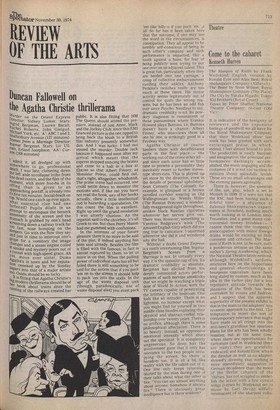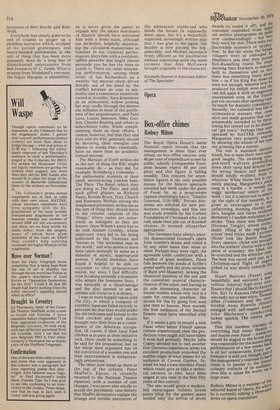Come to the cabaret
Kenneth Ilurren
The Marquis of Keith by Frank Wedekind; English version by Ronald Eyre and Alan Best; Royal Shakespeare Company (Aldwych) The Beast by Snoo Wilson; Royal Shakespeare Company (The Place) The City by Yutaka Higashi; Tokyo Kid Brothers (Royal Court) Equus by Peter Shaffer; National , Theatre Company; re-cast (Old Vic) It is indicative of the benignity of reviewers and the expansive feelings of goodwill we all have for the Royal Shakespeare Company that their Wedekind show last week has been greeted with sue') extravagant praise; in which, indeed, I feel almost bound to join. The production is vastly buoyant and imaginative, the principal performances dashingly accomplished, the music engaging and the costumes (if it is not too tactless to mention them) splendidly lavish. These are no small advantages and the evening passes agreeably.
There is, however, the question of the, um, play, which is set in Munich in 1899. If it were not that the RSC had been having such a doleful time — a sequence of dubious Shakespearian experiments at Stratford, nothing much worth looking at in London since Travesties, and a great many controversial money troubles — cannot think that the company's preoccupation with minor foreign drama would be exciting so little comment and criticism. The Marquis of Keith is not, to be sure, such a ponderous antique as the same author's Spring Awakening, which the National Theatre lately revived, although Wedekind's sardonic strictures here on the hypocrisies and general shortcomings of bourgeois capitalism have been long staled by custom, much as his plea in the earlier play for a less repressive attitude towards the pleasures of the flesh has been overtaken by events and fashion; and I suspect that the apparent superiority of the present exhibit is due in the main to the adapters' less reverent approach to the text. The temptation to inject the sort of contemporary relevance that might have made us all cringe into the anti-hero's grandiose but spurious plans for the arts has been wholly resisted; but at the same time, where there are opportunities for Caricature (and in Wedekind there are many) they are gratefully embraced; and Ronald Eyre, who is the director as well as co-adapter, shrewd'y divining that nothing is more immediately suggestive of German decadence than the mood of -the Berlin cabarets of the 'thii-ties, has not scrupled to embellish the action with a few cynical songs (verses by Wedekind set to music by Carl Davis) wilfully reminiscent of the sharpest colla
borations of Bert Brecht and Kurt Weill.
Everybody has clearly gone to no end of trouble to ginger up a plodding narrative which, stripped of its period grotesques and heavy-handed pretensions, is the sort of thing that has been more piquantly done by a long line of disenchanted entertainers from Ben Jonson to W. C. Fields. What is missing from Wedekind's con-man, the bogus Marquis, is plausibility: he is never given the patter to explain why the astute merchants of Munich should have entrusted him with a brass mark, although Ian McKellen, helpfully abandon ing the calculated mannerisms so familiar in his classical performances, plays him with a confident, raffish panache that might almost persuade you he has the lines to justify it. There are other interest ing performances, among them those of Ian Richardson as a wealthy but morose chum driven literally out of his mind by the conflict between an urge to sensuality and a conscience sensitively rooted in morality, Sara Kestelman as an aristocratic widow picking her way coolly through the desires she inflames in most of the gentlemen of her acquaintance, and Patti Love, Louise Jameson, Mike Gwilym, Charles Keating and others in subordinate roles. While complimenting them on their efforts, I cannot, however, feel that they and Eyre and the RSC generally should be devoting their energies and talents to works that, essentially, have no more than an academic textual interest.
The Marquis of Keith strikes me as the sort of thing the RSC might reasonably do — as they did, for example, Strindberg's Comrades — for enthusiastic students at their small, second-string London base, The Place. The Beast, which they are doing at The Place, and with such gifted players as Richard Pasco, Brenda Bruce, Tony Church and Rosemary McHale among the nonplussed personnel, strikes me as the sort of thing they should leave to the remoter outposts of the `fringe,' where tastes are notoriously as indulgent as they are bizarre. Snoo Wilson's piece has to do with Aleister Crowley, whose unsavoury ways led to his being publicised in the 'twenties and 'thirties as "the wickedest man in the world," and who seems to have been taken seriously by some as a diabolist of mystic, supernatural powers. I should doubtless have found it helpful to be able to succumb to this preposterous notion, but since I find difficulty even in taking seriously a dramatist who adopts the forename Snoo, I was naturally at a disadvantage and the play seemed to me as aimless and trivial as it is dreary. I was no more happily taken with The City, in which a company of youthful Japanese failed entirely to persuade me that they would prefer the old teahouses and kabuki to the fried chicken and rock music brought into their lives as a consequence of the American occupation. Of course, if their local fried chicken is as poor as their imitative rock, there could be something to be said for the proposition, but on the whole their argument has all the conviction of a wooden yen and their entertainment is embarrassingly pretentious.
The other item listed up there at the top of the column, Peter Shaffer's Equus, is recently returned to the National Theatre repertory with a number of cast changes. I was never able wholly to accept the psychiatric case-history that Shaffer. invented to explain the strange and terrible aberration of
the adolescent stable-lad who blinds the horses he supposedly dotes upon, but it's a beautifully organised, arrestingly written play that I was glad to see again. Dai Bradley is now playing the boy, admirably, and Michael Jayston is firmly efficient as the psychiatrist without conveying quite the inner torment that Alec McCowen brought originally to the character.
Kenneth Hurren is Associate Editor of The Spectator











































 Previous page
Previous page